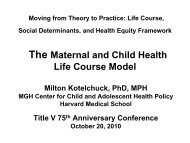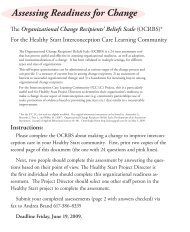MCH Training Program Performance Measures - HRSA
MCH Training Program Performance Measures - HRSA
MCH Training Program Performance Measures - HRSA
You also want an ePaper? Increase the reach of your titles
YUMPU automatically turns print PDFs into web optimized ePapers that Google loves.
<strong>MCH</strong> <strong>Training</strong> <strong>Program</strong><br />
<strong>Performance</strong> <strong>Measures</strong><br />
October 5, 2010<br />
Laura Kavanagh, MPP<br />
Department of Health and Human Services<br />
Health Resources and Services Administration (<strong>HRSA</strong>)<br />
Maternal and Child Health Bureau (<strong>MCH</strong>B)<br />
Division of Research, <strong>Training</strong> and Education
Overview<br />
• Review updated <strong>Performance</strong> <strong>Measures</strong><br />
and Administrative Forms<br />
• Changes to Non-Competing Continuations<br />
• New Reporting Timeframes<br />
• Resources for You
PM 07 Family Participation<br />
• This is an <strong>MCH</strong>B-wide measure<br />
• Very Similar to old PM 07<br />
• Divided elements that asked multiple<br />
questions into separate elements<br />
• Was 6 element scale, now 8 elements
Family Members/youth/consumers<br />
1. Participate in the planning and evaluation of activities<br />
2. Culturally diverse<br />
3. Offered training, mentoring, and opportunities to lead<br />
4. Compensated for time and expenses<br />
5. Advisory committees or task forces<br />
6. Feedback obtained from them—NEW<br />
7. Provide training<br />
8. Paid staff or consultants
PM 08 Field Leadership<br />
• Provides sample leadership activities in<br />
each area (academic, clinical, public<br />
health practice, public policy and<br />
advocacy)<br />
• Sample survey instrument is available that<br />
maps to these activities
PM 09 Underrepresented Groups<br />
• Revised to focus on underrepresented<br />
racial and ethnic groups<br />
• Categories based on U.S. Census<br />
• Includes <strong>MCH</strong> supported and non<br />
supported trainees
PM10 Cult and Ling Competence<br />
• Replaces old PM 11 that was specific to<br />
training<br />
• Uses the term cultural and linguistic<br />
competency throughout<br />
• Divided elements that asked multiple<br />
questions into separate elements<br />
• E.g., planning, implementing and evaluating
PM10 Cult and Ling Competence<br />
• OLD--Faculty/staff are culturally diverse<br />
and linguistically and culturally competent.<br />
• NEW--Staff and faculty reflect cultural and<br />
linguistic diversity of the significant<br />
populations served.
PM 59 Collaboration with Title V<br />
• Now required for all Long Term <strong>Training</strong><br />
<strong>Program</strong>s<br />
• Rate whether collaborate in these areas:<br />
• Service<br />
• <strong>Training</strong><br />
• Continuing Education<br />
• Technical Assistance<br />
• Product Development<br />
• Research
Products and Publications<br />
• No longer a PM, but a form<br />
• Will be reported by all <strong>MCH</strong>B grantees<br />
• Clarified definitions and provided<br />
examples<br />
• More detail for web-based and electronic<br />
• New Category on press materials
PM 84 Working with <strong>MCH</strong> Populations<br />
•New PM<br />
• Will generate baseline data<br />
• The <strong>Training</strong> <strong>Program</strong> does not currently<br />
have data on graduates’ work with the<br />
<strong>MCH</strong> population across all long-term<br />
training programs.
PM 85 Engagement in Policy<br />
• New Measure<br />
• Degree to which <strong>MCH</strong>B long-term training<br />
grantees engage in policy development,<br />
implementation, and evaluation.<br />
• Wanted to capture trainee as well as<br />
faculty efforts
PM 85 Engagement in Policy<br />
1. Didactic training on policy & advocacy<br />
2. Practicum/field/clinical policy & advocacy<br />
exposures<br />
3. Assessment of trainee policy knowledge &<br />
skills<br />
4. Research findings communicated to agency<br />
leaders and policy officials<br />
5. Faculty/staff contribute to public policy<br />
6. Participate in <strong>MCH</strong> advocacy networks,<br />
initiatives
Short and Medium Term Trainees<br />
• Requests additional information for<br />
trainees with150-299 contact hours re:<br />
race/ethnicity, gender and discipline
Short and Medium Term Trainees<br />
Category of Trainees Data Requested<br />
Short-term
Tech Asst and CE Forms<br />
• Pick list provided for topics and recipients<br />
• Asks about emerging issues
TA, Collaboration Reporting Data<br />
• Total # TA, Collaboration Activities<br />
• Total # TA Activities/Type of Recipient<br />
• # Activities/Geographic Audience<br />
• For Most Significant 8-10:<br />
- Topic (pick list)<br />
- Geographic Audience (pick list)<br />
- Intensity (definitions, pick list)<br />
- Recipient/Collaborator Type (pick list)<br />
• Emerging Issues
<strong>Training</strong>, CE Reporting Data<br />
• Total # Participants<br />
• Total # Sessions<br />
• # Sessions/Geographic Audience<br />
• # Sessions w/Credits Provided<br />
• For Most Significant 8-10:<br />
- Topic (pick list)<br />
- Geographic Audience (pick list)<br />
- Method (pick list)<br />
- # Participants<br />
- Y/N Credits<br />
• Emerging Issues
PM 33 Sustainability<br />
• New Measure for Distance Learning,<br />
Certificate, Pipeline, and Knowledge to<br />
Practice <strong>Program</strong>s<br />
• Degree to which <strong>MCH</strong>B-funded initiatives work<br />
to promote sustainability of their programs or<br />
initiatives beyond the life of <strong>MCH</strong>B funding.<br />
• Rate nine actions or strategies that build toward<br />
program sustainability.
PM 82 Adult Learning, Education & Technology<br />
• New Measure for Distance Learning<br />
<strong>Program</strong>s<br />
• Degree to which <strong>MCH</strong> training programs use<br />
principles of adult learning, scholarly and<br />
scientific research, and effective education<br />
models that utilize available technology.<br />
• Rate 8 elements that reflect the use of adult<br />
learning and education models that utilize<br />
technology.
PM 83 Pipeline Preparation<br />
• New Measure for Pipeline <strong>Program</strong>s<br />
• Pipeline graduates enter graduate programs<br />
preparing them to work with <strong>MCH</strong> population.
Non Competing Continuations<br />
Beginning FY 2011, Grantees<br />
will no longer use<br />
Grants.gov to submit their<br />
Noncompeting Continuation<br />
(NCC) Progress Report<br />
• Submit the entire NCC<br />
through <strong>HRSA</strong>’s<br />
Electronic Handbooks<br />
(EHBs).<br />
• Reference: <strong>HRSA</strong><br />
Noncompeting<br />
Continuation Progress<br />
Report EHB User<br />
Guide<br />
(http://www.hrsa.gov/gr<br />
ants/noncompetingconti<br />
nuation/index.html)
New SF-PPR package in <strong>HRSA</strong> EHBs<br />
• Two forms: SF-PPR cover page and SF-PPR-2)<br />
• <strong>Performance</strong> Narrative - Document project activities and<br />
accomplishments for the reporting period (8 pages) with<br />
headings similar to what you have reported previously.<br />
• Requests to change the approved project plan must be<br />
submitted separately from the NCC/Progress Report<br />
using EHBs “Prior Approval.”<br />
• Appendices (This section captures additional<br />
attachments required by program office)
Non Competing Continuations: Changes<br />
Budget<br />
• Originally approved budget for<br />
all years of the project are used<br />
• Any budget changes need to be<br />
requested using Prior Approval<br />
in EHB
Grant Start<br />
Date<br />
NCC Proposed Timeline<br />
NCC Available in<br />
EHB<br />
NCC<br />
Deadline<br />
June 1 Approx March 1 Apr 1<br />
July 1 Approx April 1 May 1<br />
Please note: If any request for changes/modifications<br />
to the grant is submitted at the time of NCC, the<br />
NCC will be returned to the grantee via EHBs and<br />
the grantee will be required to revise and resubmit.
DGIS Reporting Timeline<br />
So,<br />
What do I do....<br />
when Reporting over this next<br />
year?
DGIS Reporting Timeline<br />
Current <strong>Performance</strong> Report – Fall 2010<br />
• <strong>MCH</strong>B training grants currently have a performance<br />
report open<br />
• FFY2009 final reporting data is being collected<br />
• Current Forms and <strong>Performance</strong> <strong>Measures</strong> are being<br />
reported in this performance report<br />
• <strong>Performance</strong> reports due this fall<br />
– Deadlines for reporting are between September 15,<br />
2010 and December 17, 2010<br />
• No extensions will be granted
DGIS Reporting Timeline<br />
Transition to New System – January 2011<br />
• No performance report extensions due to conversion to<br />
new performance reporting system<br />
• Old system (current forms and PMs) will close in<br />
December 2010<br />
– All FFY2009 reporting data must be in by December<br />
2010<br />
• New system with New OMB approved forms and PMs to<br />
open in January 2011
DGIS Reporting Timeline<br />
Next Year’s Non-Competing Continuation/Progress<br />
Report – Spring 2011<br />
• No provisional data will be collected in DGIS at next<br />
spring’s NCC application/progress report<br />
• Final data will be collected after the budget period is<br />
over at the time of performance report
DGIS Reporting Timeline<br />
Next <strong>Performance</strong> Report – Summer to Fall 2011<br />
• <strong>Performance</strong> Report will open in Summer 2011 after<br />
FY2011 NGA released for collection FFY2010<br />
performance reports<br />
• These New set of forms/PMs are to be used<br />
• <strong>Program</strong>s must begin collecting data for the new forms<br />
and measures now
DGIS Reporting Timeline<br />
New FY2011 <strong>Training</strong> Grants<br />
• Grants receiving competing continuation in FY2011 will<br />
complete the “new” performance report<br />
LEND<br />
Collaborative Office Rounds<br />
<strong>MCH</strong> Pipeline<br />
• <strong>Performance</strong> report to open after release of FY2011<br />
NGA<br />
120 days to complete this first performance report<br />
Provide budgets, PM objectives, abstract, project summary
Summary<br />
DGIS Reporting Timeline<br />
• Current <strong>Performance</strong> Report<br />
Current forms/PMs<br />
FFY2009 data<br />
Due by December 2010, no extensions<br />
• NCC Application – No provisional DGIS data collected<br />
• Next Year’s <strong>Performance</strong> Report<br />
New forms/PMs<br />
FFY2010 data, 120 days after NGA to complete<br />
Due Summer-Fall 2011<br />
• New <strong>Performance</strong> Report-New Competing Grants<br />
New forms/PMs – LEND, COR, <strong>MCH</strong> Pipeline<br />
120 days after NGA to complete


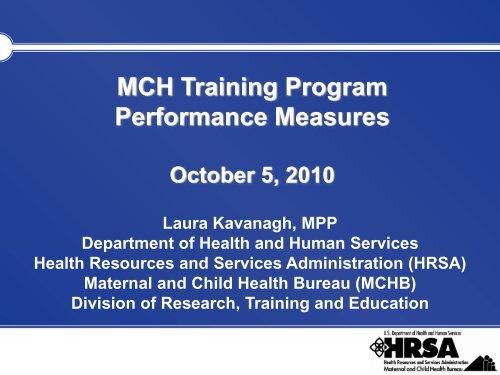
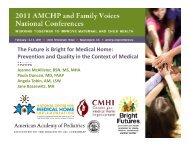
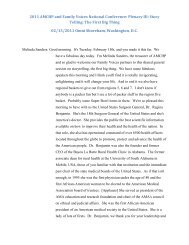
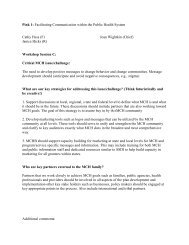

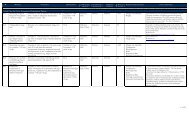
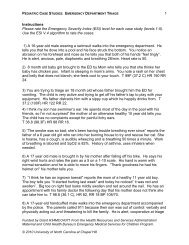
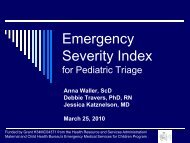
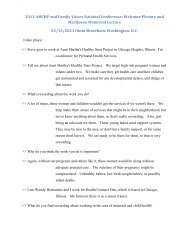
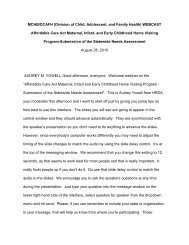
![Hormone Disruptors and Women's Health: Reasons for Concern [PDF]](https://img.yumpu.com/19410002/1/190x245/hormone-disruptors-and-womens-health-reasons-for-concern-pdf.jpg?quality=85)


